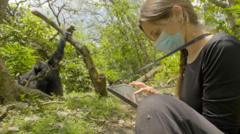Chimpanzees in Uganda have surprised researchers by demonstrating the ability to self-medicate using indigenous plants, a behavior captured on film by scientists from the University of Oxford in collaboration with local teams in the Budongo Forest. The footage reveals these apes treating open wounds and other injuries not just on themselves, but also tending to those of fellow chimpanzees.
This research expands on findings from last year that indicated chimpanzees consume specific plants for medicinal properties. By integrating decades of observations, the scientists created a comprehensive catalogue detailing various ways chimpanzees utilize what can be termed “forest first aid.” Their groundbreaking study, featured in the journal *Frontiers in Ecology and Evolution*, adds to increasing evidence that non-human primates, such as orangutans and gorillas, employ natural remedies to promote well-being in their natural habitats.
Elodie Freymann, the lead researcher, described the extensive behavioural strategies chimpanzees have for treating illnesses or injuries in the wild. "Some of these include the use of local plants in quite inventive ways," she shared. For instance, chimps were observed chewing plant material and applying it directly to their injuries for relief. Remarkably, footage captured a young female chimp treating a wound on its mother, while other cases showed unrelated chimps assisting in removing snares from each other’s limbs, suggesting a level of empathy previously unrecognized in non-human species.
The researchers also delved into decades of records kept at a field station in the Budongo Forest, with anecdotes dating back to the 1990s detailing unusual behavior among the chimpanzees. Some notes discuss chimpanzees using leaves to clean themselves after defecation, showcasing hygiene practices strikingly similar to those of humans.
The research team has previously identified specific plants that chimpanzees consume for their healing properties. Upon testing these plants, they discovered many with antibacterial qualities, providing scientific backing for the chimpanzees' instinctual healing practices. Interestingly, chimpanzees aren’t alone in this knowledge; recent studies have documented orangutans utilizing similar methods to care for their wounds.
Dr. Freymann emphasized that understanding wild chimpanzee behavior gives insights into human perceptions of the natural world. "If I were stranded in the forest without food or medical supplies, I wouldn't last long. However, chimpanzees thrive here because they possess intimate knowledge of their surroundings and its resources," she concluded, laying bare the evolutionary wisdom inherent in these primate relatives.
This research expands on findings from last year that indicated chimpanzees consume specific plants for medicinal properties. By integrating decades of observations, the scientists created a comprehensive catalogue detailing various ways chimpanzees utilize what can be termed “forest first aid.” Their groundbreaking study, featured in the journal *Frontiers in Ecology and Evolution*, adds to increasing evidence that non-human primates, such as orangutans and gorillas, employ natural remedies to promote well-being in their natural habitats.
Elodie Freymann, the lead researcher, described the extensive behavioural strategies chimpanzees have for treating illnesses or injuries in the wild. "Some of these include the use of local plants in quite inventive ways," she shared. For instance, chimps were observed chewing plant material and applying it directly to their injuries for relief. Remarkably, footage captured a young female chimp treating a wound on its mother, while other cases showed unrelated chimps assisting in removing snares from each other’s limbs, suggesting a level of empathy previously unrecognized in non-human species.
The researchers also delved into decades of records kept at a field station in the Budongo Forest, with anecdotes dating back to the 1990s detailing unusual behavior among the chimpanzees. Some notes discuss chimpanzees using leaves to clean themselves after defecation, showcasing hygiene practices strikingly similar to those of humans.
The research team has previously identified specific plants that chimpanzees consume for their healing properties. Upon testing these plants, they discovered many with antibacterial qualities, providing scientific backing for the chimpanzees' instinctual healing practices. Interestingly, chimpanzees aren’t alone in this knowledge; recent studies have documented orangutans utilizing similar methods to care for their wounds.
Dr. Freymann emphasized that understanding wild chimpanzee behavior gives insights into human perceptions of the natural world. "If I were stranded in the forest without food or medical supplies, I wouldn't last long. However, chimpanzees thrive here because they possess intimate knowledge of their surroundings and its resources," she concluded, laying bare the evolutionary wisdom inherent in these primate relatives.



















